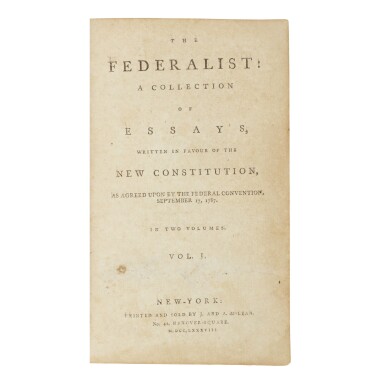(Hamilton, Alexander)Report of the Secretary of the Treasury of the United States, on the Subject of Manufactures. Presented to the House of Representatives, December 5, 1791. [Philadelphia:] Printed by Childs and Swaine, [1791] Folio (340 x 212 mm). Stained throughout, evidently from a combination of damp and cleaning, in light purple "Rorschach" patterns, many leaves extended or with paper restoration, chiefly marginal and especially to corners, final leaf trimmed short and with more extensive restoration including the loss of a few letters, lacking final blank as usual. Retrospective calf-backed marbled boards. "One of the great American state papers, 'the Magna Carta of industrial America'" (Howes), with distinguished capitalist provenance. "In this report Hamilton first set down in a formal way the economic principles by which he expected to see the new nation expand its manufacturing base. He compiled his report with the objective of encouraging American industry to compete with European imports and free the country from its dependence on foreign goods. … Hamilton's report can now be seen as the genesis of American manufacturing might. At the time, it was the only one of his major reports which failed to get a favorable reception from the House of Representatives, to whom it was submitted," although in time Congress would adopt almost all of the Report's recommendations (Celebration). Hamilton's Report contended that the United States would never become fully independent until the country was self-sufficient in all necessary economic products. His plan—which was instrumental in transforming the nation from an agrarian to an industrial economy and which would inspire the American School of economics—sought to encourage that self-sufficiency through tariffs on foreign goods and subsidies of domestic industry, including government investment in what is now called infrastructure. "Like Hamilton’s other major state papers, the 'Report on Manufactures' is distinguished not so much by originality of thought as by the cogency and persuasiveness of its arguments, its far-reaching implications, and its ennobling vision of the destiny of the United States. … In this sense, the Report is as much a product of its times as the creation of its author, for many of the ideas which it contains had been debated for decades on both sides of the Atlantic" (Syrett). Rare: this is one of just three copies to be sold at auction since 1951, the most recent of which was more than a decade ago. PROVENANCEThe Forbes Collection of American Historical Documents (Christie's, 2 November 2006, lot 17) REFERENCECelebration of My Country 127; Evans 23914; ESTC W29050; Federal Hundred 38; Ford, Bibliotheca Hamiltoniana 201; Howes H123; Sabin 29977; cf. Syrett, "Introductory Note: Report on Manufactures," in The Papers of Alexander Hamilton, 10: pp. 1–15
(Hamilton, Alexander)Report of the Secretary of the Treasury of the United States, on the Subject of Manufactures. Presented to the House of Representatives, December 5, 1791. [Philadelphia:] Printed by Childs and Swaine, [1791] Folio (340 x 212 mm). Stained throughout, evidently from a combination of damp and cleaning, in light purple "Rorschach" patterns, many leaves extended or with paper restoration, chiefly marginal and especially to corners, final leaf trimmed short and with more extensive restoration including the loss of a few letters, lacking final blank as usual. Retrospective calf-backed marbled boards. "One of the great American state papers, 'the Magna Carta of industrial America'" (Howes), with distinguished capitalist provenance. "In this report Hamilton first set down in a formal way the economic principles by which he expected to see the new nation expand its manufacturing base. He compiled his report with the objective of encouraging American industry to compete with European imports and free the country from its dependence on foreign goods. … Hamilton's report can now be seen as the genesis of American manufacturing might. At the time, it was the only one of his major reports which failed to get a favorable reception from the House of Representatives, to whom it was submitted," although in time Congress would adopt almost all of the Report's recommendations (Celebration). Hamilton's Report contended that the United States would never become fully independent until the country was self-sufficient in all necessary economic products. His plan—which was instrumental in transforming the nation from an agrarian to an industrial economy and which would inspire the American School of economics—sought to encourage that self-sufficiency through tariffs on foreign goods and subsidies of domestic industry, including government investment in what is now called infrastructure. "Like Hamilton’s other major state papers, the 'Report on Manufactures' is distinguished not so much by originality of thought as by the cogency and persuasiveness of its arguments, its far-reaching implications, and its ennobling vision of the destiny of the United States. … In this sense, the Report is as much a product of its times as the creation of its author, for many of the ideas which it contains had been debated for decades on both sides of the Atlantic" (Syrett). Rare: this is one of just three copies to be sold at auction since 1951, the most recent of which was more than a decade ago. PROVENANCEThe Forbes Collection of American Historical Documents (Christie's, 2 November 2006, lot 17) REFERENCECelebration of My Country 127; Evans 23914; ESTC W29050; Federal Hundred 38; Ford, Bibliotheca Hamiltoniana 201; Howes H123; Sabin 29977; cf. Syrett, "Introductory Note: Report on Manufactures," in The Papers of Alexander Hamilton, 10: pp. 1–15



.jpg)





.jpg)



.jpg)

Testen Sie LotSearch und seine Premium-Features 7 Tage - ohne Kosten!
Lassen Sie sich automatisch über neue Objekte in kommenden Auktionen benachrichtigen.
Suchauftrag anlegen